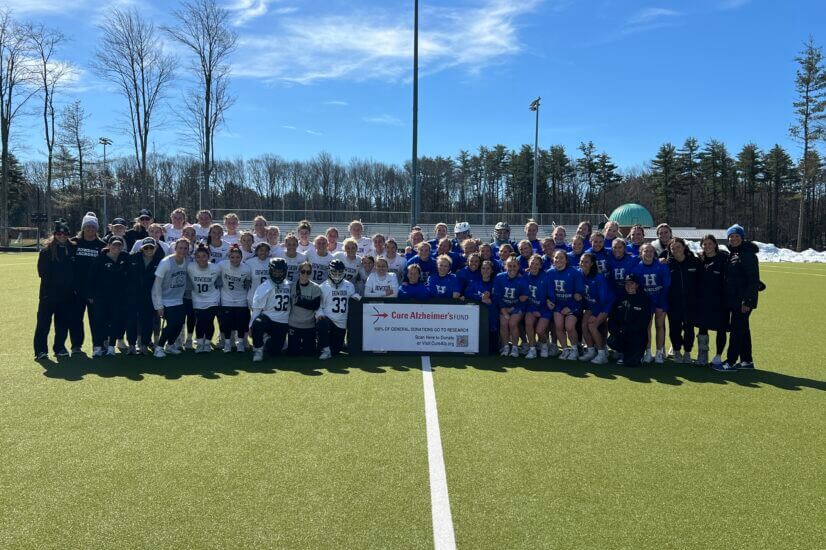
Posted March 5, 2007
Boston – Massachusetts General Hospital (MassGeneral) has honored Cure Alzheimer’s FundTM for its leadership, entrepreneurial philanthropy and investment in research projects that have the highest probability of slowing, stopping or reversing Alzheimer’s disease. The first annual Award for “Philanthropic Innovation and Investment” was presented to the Fund by MassGeneral’s Institute for Neurodegenerative Disease, at a ceremony at Massachusetts General Hospital on Friday, March 2.
This new award seeks to recognize donors who have made substantial commitments to visionary work that cannot be funded through other sources but has the potential to radically change scientific thinking and drug discovery for neurodegenerative disease.

“We are extremely proud of this prestigious award from our friends at MassGeneral,” says Jeffrey Morby, co-founder and chairman of Cure Alzheimer’s Fund. “Our partnership has made great strides in Alzheimer’s research, and we look forward to expanding our work with MassGeneral and continuing on this path of progress. Our Fund is committed to funding the best research conducted anywhere in the world, focused on one objective: to find a cure for Alzheimer’s disease.”
“This award exemplifies how grateful we are to Cure Alzheimer’s Fund for its extraordinary commitment to the field,” says Anne Young, Chief of MGH Neurology. “This organization has been instrumental in pushing forward the research more rapidly than before to reach a cure.”
The Cure Alzheimer’s Fund has taken a unique venture capital approach to philanthropy that begins with a well-thought-out strategy (a Roadmap defining the best research projects to undertake and when), followed by implementation measures designed to accelerate discovery with no financial return to the Foundation, founders or donors.
Since its incorporation in September 2004, the Fund has invested more than $3 million in groundbreaking Alzheimer’s research projects across the country, with the ultimate goal of funding $15 million per year. “This highly effective group has provided an incredible advantage to the research community,” says Dr. Rudy Tanzi, Director of the Genetics and Aging Research Unit of MassGeneral Institute of Neurodegenerative Diseases and Chairman of the Cure Alzheimer’s Fund Research Consortium. “This is an exciting time for Alzheimer’s research with more and more important and relevant discoveries being made each month. I am optimistic about the contributions that our work will make to finding effective new therapies for this terrible disease. The dedication of the Cure Alzheimer’s founders to this cause is most admirable, and we are very grateful to have them as collaborators.”
The Alzheimer’s Genome ProjectTM (AGP) Initiative
The core strategy of the Foundation is the Alzheimer’s Genome ProjectTM initiative, led by Dr. Tanzi, which has the objective of identifying all relevant remaining Alzheimer’s genes that have not yet been discovered, thereby identifying more targets for the development of therapeutic interventions. Other research projects related to the AGP, funded by Cure Alzheimer’s Fund, are:
AD Brain-Genetic Study – This program, led by Dr. Bradley Hyman (MIND), compares the pathological features of autopsied brains of deceased AD patients with those of non-demented subjects to link AD pathology to genetic factors.
AD Clinical-Genetic Study – This program, headed by Dr. Deborah Blacker (MGH), tracks patients with “benign forgetfulness,” mild cognitive impairment and AD using imaging and cognitive tests to link clinical feature of AD to genetic factors.
AD Gene Database – This Internet database and forum, headed by Dr. Lars Bertram (MIND), gathers and analyzes all published studies and data relating to AD genetics, and provides weekly updates regarding ongoing attempts to identify novel AD genes.
In addition to the above, the Cure Alzheimer’s Fund has funded the following projects:
ACAT Inhibitor Study – Directed by Dr. Dora Kovacs (MIND), this two-part study focuses on the effect of a particular drug targeted at a cholesterol-related enzyme (ACAT1), with the objective of preventing or decreasing the production of neurotoxic Abeta in the brain.
Abeta Oligomer Study – This research project, being undertaken by six research centers throughout the Country, is focused on understanding the negative impact of Abeta oligomers on brain synaptic activity.
Cure Alzheimer’s FundTM is a 501c3 public charity established to fund targeted research with the highest probability of slowing, stopping or reversing Alzheimer’s disease. For more information please visit http://www.curealzfund.org/





